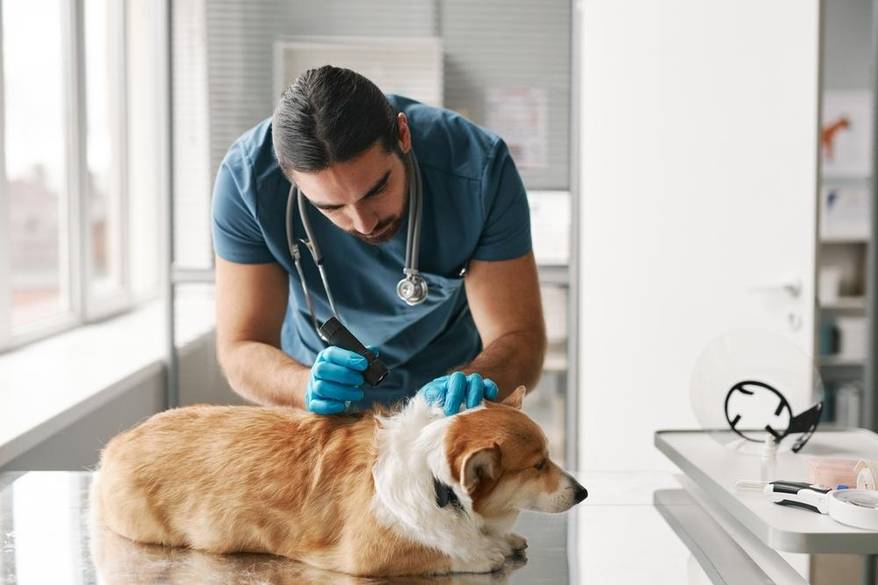
-
Find the right food for your petTake this quiz to see which food may be the best for your furry friend.Find the right food for your petTake this quiz to see which food may be the best for your furry friend.Featured products
 Hill's Science Diet Adult Chicken & Beef Entrée Dog Food
Hill's Science Diet Adult Chicken & Beef Entrée Dog FoodChicken & Beef Entrée in a delicious loaf with complete & balanced nutrition to help keep adult dogs active and healthy
Shop Now Adult Chicken & Barley Recipe Dog Food
Adult Chicken & Barley Recipe Dog FoodSupports lean muscle and beautiful coat for adult dogs
Shop Now Adult Large Breed Chicken & Barley Recipe Dog Food
Adult Large Breed Chicken & Barley Recipe Dog FoodSupports healthy joints, lean muscle, and beautiful coat for large breed dogs
Shop NowFeatured products Adult 7+ Indoor Chicken Recipe Cat Food
Adult 7+ Indoor Chicken Recipe Cat FoodSupports energy level and beautiful fur in mature indoor cats
Shop Now Senior Vitality Adult 7+ Tuna & Vegetables Stew
Senior Vitality Adult 7+ Tuna & Vegetables StewImproves Everyday Ability to Get Up & Go
Shop Now Adult Turkey & Liver Entrée Cat Food
Adult Turkey & Liver Entrée Cat FoodPrecisely balanced nutrition with the delicious taste of minced turkey & liver to help fuel the energy needs of cats during the prime of their life
Shop Now -
Dog
- Dog Tips & Articles
-
Health Category
- Weight
- Food & Environmental Sensitivities
- Urinary
- Digestive
- Joint
- Kidney
-
Life Stage
- Puppy Nutrition
- Adult Nutrition
- Senior Nutrition
Cat- Cat Tips & Articles
-
Health Category
- Weight
- Skin & Food Sensitivities
- Urinary
- Digestive
- Kidney
-
Life Stage
- Kitten Nutrition
- Adult Nutrition
Featured articles The Science Behind Our Love for Pets
The Science Behind Our Love for PetsLearn the scientific reasons why we have such strong connections with our pets, and what science says about the love between humans and our furry friends.
Read More What Is Littermate Syndrome? Pet Adoption Guide
What Is Littermate Syndrome? Pet Adoption GuideLearn more about littermate syndrome in dogs and cats and how to successfully navigate adoption and early socialization processes.
Read More How to Properly Mix Wet & Dry Pet Foods
How to Properly Mix Wet & Dry Pet FoodsAn Orange cat eating from a bowl filled with mixed food
Read More -


Skin is the largest organ in your dog's body. And because it's on the outside, it's constantly exposed to the environment. Fortunately, dog skin diseases are usually more noticeable than other organ diseases. This is why skin checks are one of the most common reasons pet parents take their dogs to the veterinarian. But what should you look for, exactly, and what does dog skin disease treatment entail?
Here are seven of the more common skin issues in dogs, including their causes, diagnosis and treatment. Keeping this information under your hat can help you get your dog the care they need.
7 Dog Skin Diseases to Be Aware Of

1. Skin Parasites
Skin and hair parasites are common in dogs, and they typically lead to excessive scratching. Fleas, ticks, cuterebra larvae, biting flies, mosquitoes and skin mites are found on pets from coast to coast, though parasites vary by region. These bugs range in size from visible to the naked eye to microscopic, but they can all cause problems, including itching, red skin, hair loss and associated infectious diseases. Fortunately, your veterinarian can help you control and prevent most of these pests. Ask your vet about parasite risks in your area and the best preventive options for your dog.
2. Skin Infections
All dogs carry low levels of yeast and bacteria on their skin as part of their normal, healthy flora. Issues occur when something damages or irritates the skin, which can lead to bacterial or yeast (fungal) overgrowth, creating a skin infection. Bacterial skin infections are called pyoderma. Signs can include red skin, red bumps, flaky or oozing skin, itching and hair loss. Pyotraumatic dermatitis, also known as hot spots, is a severe local bacterial skin infection commonly caused by self-trauma due to excessive scratching, resulting in an open wound.
Yeast skin infections can cause skin odor, redness, hair loss and, in severe cases, thickened, black skin. Primary skin infections are rare in dogs. They're usually secondary to another condition, such as seasonal allergies or hormonal disorders.
3. Skin Abscesses
Abscesses result from a bacterial infection under the skin that creates a pocket of pus. Bite wounds often cause skin abscesses in dogs, but foreign bodies — such as grass, sticks or splinters — can also get stuck under the skin and lead to an abscess. Abscesses cause local pain, swelling, fever and lethargy, and they may rupture, causing an open wound. Your veterinarian can treat this skin concern with antibiotics.
4. Skin Hypersensitivities (Allergies)
Dogs of all shapes and sizes can have allergies. Allergies cause itching, skin redness, hair loss, secondary skin infections and recurrent ear infections. The most common skin allergies in dogs include flea allergy, atopy, food allergy and contact allergy. Your vet will diagnose an allergy by ruling out all other causes of skin problems first, which may include evaluating your dog's response to treatment. Depending on the allergy, treatments can include medication, medicated shampoo, supplements and immunotherapy. In most cases, allergies are managed, not cured.



Tasty Tips
5. Skin Cancer
Lumps, bumps and skin growths are common in older dogs and certain breeds, such as Labrador retrievers. Skin growths may be benign or cancerous. If you notice an abnormal growth, lump, bump or crusting lesion on your dog, take them to your veterinarian. They can evaluate the lump and may recommend a fine needle aspiration of cells or a biopsy to determine whether it's cancerous. Skin cancer treatment includes surgery, radiation and chemotherapy. Even if the suspicious bump turns out to be a benign mass that doesn't require treatment, you'll sleep better knowing there's nothing to worry about.
6. Skin Autoimmune Disorders
Dogs can develop autoimmune disorders, characterized by a dysregulated immune system that attacks the body. Skin autoimmune disorders cause the skin layers to separate, resulting in painful skin blisters, pustules, crusts, seborrhea, hair loss and secondary skin infections. Dogs with autoimmune disease often develop fever, loss of appetite and lethargy as well. Autoimmune skin diseases are rare in dogs. Pemphigus foliaceus is the most common autoimmune disease in dogs; If your vet suspects this skin concern, they'll recommend a skin biopsy. Treatment includes immunosuppressive medication and medicated shampoo.
7. Hormonal Disorders
Older dogs can develop hormonal disorders that may impact skin health. For example, Cushing's disease, an adrenal gland disorder, can cause hair loss, skin thinning and skin infections in dogs. Hypothyroidism causes low levels of thyroid hormone, which can result in hair loss, dandruff and excessive sebum (oil) production, causing a greasy coat. Your vet can diagnose hormonal conditions with a physical exam and laboratory testing. Hormonal conditions aren't typically curable, but you can manage them with medication.
Caring for Your Dog From Head to Toe
Dog skin diseases have a range of causes, and dog skin disease treatment depends on diagnosis. If you notice something abnormal with your dog's skin, consult your veterinarian as soon as possible. Your vet has the tools and knowledge to diagnose the underlying problem and recommend treatment. To prevent skin disease in your dog, work with your veterinarian to minimize their risk through parasite prevention and regular physical exams. Together, you can give your dog the care and attention they deserve.


Dr. Sarah Wooten graduated from UC Davis School of Veterinary Medicine in 2002. A member of the American Society of Veterinary Journalists, Dr. Wooten divides her professional time between small animal practice in Greeley, Colorado, public speaking on associate issues, leadership, and client communication, and writing. She enjoys camping with her family, skiing, SCUBA, and participating in triathlons.
Related products

Supports healthy joints, lean muscle, and beautiful coat for large breed dogs

Chicken & Barley Entrée in a delicious loaf with great taste and precisely balanced nutrition to support 5 essential building blocks for lifelong health

Chicken & Beef Entrée in a delicious loaf with complete & balanced nutrition to help keep adult dogs active and healthy

Supports lean muscle and beautiful coat for adult dogs
Related articles

Wondering where can I buy a dog? Consider adoption and explore the pros and cons of adopting a dog from a breeder versus an animal shelter.

Learn how to help keep your dog's immune system in tip-top shape, including nutritional immune system support for dogs and other strategies.

Your dog's coat and skin are a big part of your dog's overall health. Ensure you keep your dog's coat healthy, by following these simple tips.

Discover how the field of dog science is giving us more and more insights into the inner workings of our furry best friends.

Put your dog on a diet without them knowing
Our low calorie formula helps you control your dog's weight. It's packed with high-quality protein for building lean muscles, and made with purposeful ingredients for a flavorful, nutritious meal. Clinically proven antioxidants, Vitamin C+E, help promote a healthy immune system.
Put your dog on a diet without them knowing
Our low calorie formula helps you control your dog's weight. It's packed with high-quality protein for building lean muscles, and made with purposeful ingredients for a flavorful, nutritious meal. Clinically proven antioxidants, Vitamin C+E, help promote a healthy immune system.

